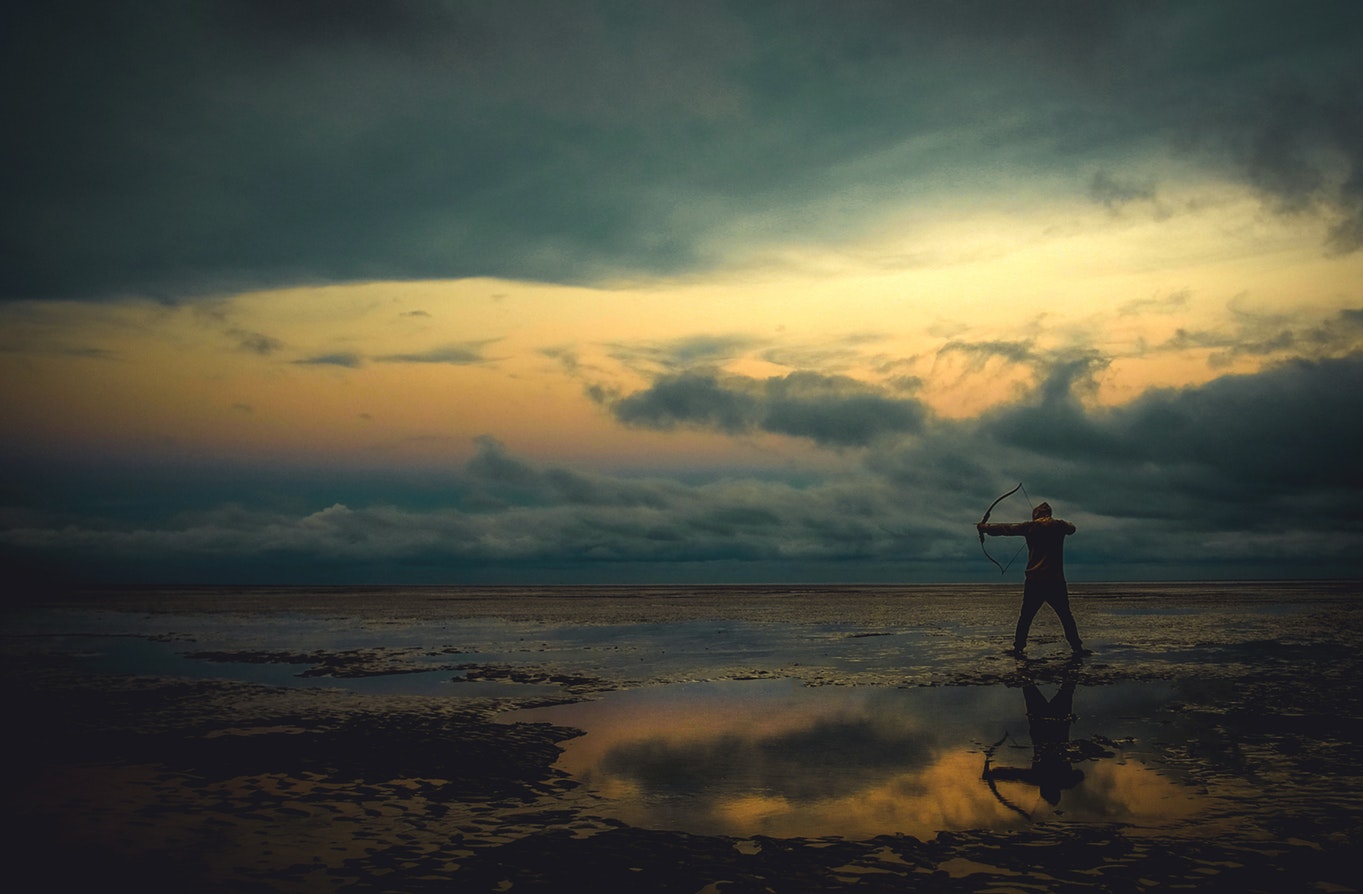A Butt-Load of Crap About the Gospel
[Keeping the Darkness at Bay, Part Seven. See also one, two, three, four, five, and six.]
On Easter Sunday this year, my family and I watched one of the greatest, most-biblical movies of all time. (No, it wasn’t The Ten Commandments. We did watch some of that one, only to make fun of it and quit watching before Moses even left Egypt.)
And no, it wasn’t The Passion of the Christ. The Passion is a fantastic movie, but it’s one you need to be in a serious mood for. Plus, it’s better to watch it on Good Friday so Easter can focus on the Resurrection.
On Easter evening, after church, after Easter dinner, after lounging around watching the Golden State Warriors and the Food Network, after playing Settlers of Catan, my dad, my twin brother, my sister-in-law, and myself watched the cinematic masterpiece Nacho Libre.
To tell the truth, I had forgotten how much I love that movie. It’s fun, it’s silly, it’s ridiculous, and it’s spiritually profound. Okay, maybe some would disagree with the profound part, but trust me. Let me explain.
The message in Nacho Libre is not only of paramount spiritual significance, but it’s lessons are crucial in our ongoing quest of “Keeping the Darkness At Bay.”
Nacho Libre
“I am, I am…a real religious man,” proclaims the song opening the movie. We’re introduced to Jack Black’s character, Ignacio, an orphan son of missionaries. And he loves wrestling. Of course, those in authority forbade wrestling, and he wasn’t allowed to fight from a young age. Yet, his love of the luchadors persisted, even as he became a cook for the very monastery he grew up in.
Now a monk with a vow of celibacy, Ignacio feels trapped. Yes, he loves the orphans. He loves the monastery, and he’s passionate about helping people. Even so, his festering love for lucha libre creates a cognitive dissonance in his life—a dissonance that only increases when Sister Encarnación (who hails from “Oaxaca Parish Convent of the Immaculate Hearts Sisters Ladies Mountains of Guadalupe”) joins the monastery and Ignacio falls in love.
As Ignacio tries impressing her, he’s constantly confronted with the reality that he doesn’t measure up. He confides to Encarnación, “the brothers don’t think I know a butt-load of crap about the gospel, but I doooo.” He confesses that he feels undervalued at the monastery. They expect him to cook, but when they don’t have money for fresh ingredients, Ignacio is blamed for the poor results. He’s rarely trusted with priestly duties beyond cooking.
He’s serving God, he’s serving the monks, he’s serving the orphans, but it isn’t enough. He wants to be a wrestler. Yet, with this desire, he feels like a hypocrite. He doesn’t fit into the monastery’s mold, so he takes a leap. He befriends and teams up with man-of-science Esqueleto, and he becomes a luchador.
But with many hilarious missteps along the way, Nacho learns about life, himself, and God. Even more than a physical journey from weird, half-white monk to professional wrestler, we get a spiritual journey.
If we don’t take that same journey in our own lives—if we don’t learn “a butt-load of crap about the gospel”—we may never see our own potential realized, our own destiny accomplished.
Lesson One: Understand Your Sin
Because of the legalism underlying the monastic lifestyle, Nacho was led to believe that professional wrestling is inherently sinful. Indeed, the brothers never told him why it was wrong, but when he was discovered dressed as a luchador when he was a child, the costume was stripped, and the monks took a garden hose to literally wash him clean.
When Nacho leads his double life, he even stops the orphans from wrestling and claims, “the Bible says thou shall not wrestle your neighbor.”
The problem? The bible doesn’t actually say that.
Nacho was repeating what he’d been taught, repeating to the children what he knew to be right, but in the process he deepened his own hypocrisy—teaching the children to live up to a standard he’d failed to measure up to his whole life.
Ignacio’s identity crisis doesn’t stem from intentional hypocrisy but from genuine confusion. He doesn’t know why wrestling is wrong. He just knows it’s wrong because he’s been told it’s wrong. But if it’s wrong, why do I like it so much?
Before Nacho is able to step into his destiny, he needs to understand why what he’s doing is sinful. Eventually, Sister Encarnación is able to explain it to him: Wrestlers fight for fame, money, and self. They do not bring glory to God. They fight for personal gain, and they hurt people in the process—not just in the ring, but they misuse their influence to hurt people in their everyday lives as well.
Wrestling isn’t the sin! The sin is pride and selfishness.
When Nacho looks closely at his desires and dreams, he can see the parts that are sinful and the parts that can be redeemed. Which leads to…
Lesson Two: Understand Where Your Desires Come From
Here, we find an error of two extremes. One person may say, “God made everything, and God gave me all my dreams and desires. Therefore, if it feels right, it must be from God.” Another person might say, “I can’t trust my wicked heart because it’s been corrupted by sin. I can’t trust my feelings at all. If it feels good, it’s probably bad and deceptive.” Both of these statements are unbiblical and wrong.
Let’s acknowledge God’s creation. He did make you. He does love you. God made everyone with unique talents, dreams, and desires, every individual an indispensable attribute to His tapestry of creation. The creator created you to be creative. Your ideas are not inherently evil. Your talents are not automatically suspect or to be feared.
At the same time, we should also acknowledge our imperfections and limitations. Humans are constantly affected by the fall of man. The consequences of Adam and Eve’s original sin will continue to complicate life until God creates the new heavens and earth. Until then, as long as we’re in our fleshy, mortal bodies, we are affected by sin.
Understanding both of these truths is crucial for Nacho to find the balance he needs to both wrestle and care for the orphans.
But how can we know which feelings correspond to God’s desire for us versus which feelings feed our corrupted, fleshly impulses? Look at your heart’s intentions.
If everything I do is centered around me—my platform, my fame, my career, my reputation—then I am likely in error and not in step with the self-less, servant heart of God. But if I’m constantly talking down to myself, saying I’m so evil, wretched, and useless, I’m still out of step with God, the very Creator who made me, loves me, values me.
Your identity is secure in Christ. Your mission is centered around Christ’s mission. You can build the Kingdom of God with your own life in a way nobody else can do.
A quick side-note—Nothing in creation is bad in and of itself. If something is deemed back for the sole reason that “it’s bad,” that might stem from a works-based legalistic understanding of life, God, and scripture.
Here’s a good rule of thumb: God creates, and sin distorts. Anything and everything sinful is a distortion of God’s original intentions. “Fun” isn’t sin, but pride is. A game or sport may not be sinful, but if you’re using it to prop up your own ego and reputation, it becomes a form of idolatry.
Part of Nacho’s journey is finding his identity secure in God, the source of his strength and power. Nacho kind of acknowledges this when he “baptized” Esqueleto before a wrestling match. But when he didn’t see God’s immediate blessing, Nacho for a season turned away from God. In his quest for glory and fame, Nacho tried getting “Eagle Powers”, which failed him along with the rest of his vanity. He even turned to worship Ramses, the ultimate luchador idol.
But Nacho’s destiny wasn’t to worship Ramses or become Ramses; Nacho needed to defeat him. But before he could defeat the idol, Nacho needed to overcome the idolatry within himself.
He needed to humble himself, and he needed to see the truth. The truth about sin and the truth about his dreams.
Lesson Three: Don’t Compartmentalize Yourself
When Nacho’s double life finally caught up to him—his monk robe poetically burning to reveal the wrestler beneath—Nacho fled to the wilderness. He couldn’t live a lie. He couldn’t teach the children hypocrisy. He couldn’t continue living a fractured existence.
He meant to die in the wilderness until he received the news: Silencio, winner of the Battle Royale, was injured and couldn’t fight Ramses. Nacho was second place, and now could face the lucha libre legend.
Could it be? Was God giving him a second chance at wrestling? Undoubtedly, Encarnación’s words echoed in his mind.
“You are a man of the cloth. Lucha Libre, it’s a sin.”
“But why?”
“Because those men fight for vanity, for money, for false pride.”
"Yes it's terrible, terrible. But is it always a sin to fight?”
“No. If you fight for something noble, or for someone who needs your help, only then will God bless you in battle.”
Nacho realized he could fight for the orphans. He could fight for the Lord. He didn’t need the fame, but he could help the orphanage, and through his wrestling people would see the glory of God.
Sister Encarnación, perhaps against orders from the brothers in charge, takes a group of orphans to the wrestling match to cheer Nacho on.
Nacho beats Ramses and keeps his promise to the orphans to buy them a bus. And with the support of his community, Nacho becomes everything he wanted to be.
The key?
He used his talents and passions for the glory of God. He was honest with himself and with the monastery.
You don’t have to live a fractured life! You can use your dreams and skills to help others and to advance the Kingdom of God!
If you want to keep the darkness at bay, both in the world around you and within your unstable heart, you must come to grips with your identity.
You are a child of God made in the image of God. In light of your identity, shun pride and embrace community. With the help of God and others, step into your destiny, no matter how unconventional.
For, according to Nacho,
“Beneath the clothes, we find a man.
And beneath the man…
we find…
his nucleus.”
If you are a Christian, within your nucleus dwells the Holy Spirit. Greater is He that is in you than he that is in the world.
You can fight the darkness. You can kill your pride. You don’t have to live a divided life! Just like Nacho, you too can be libre.




